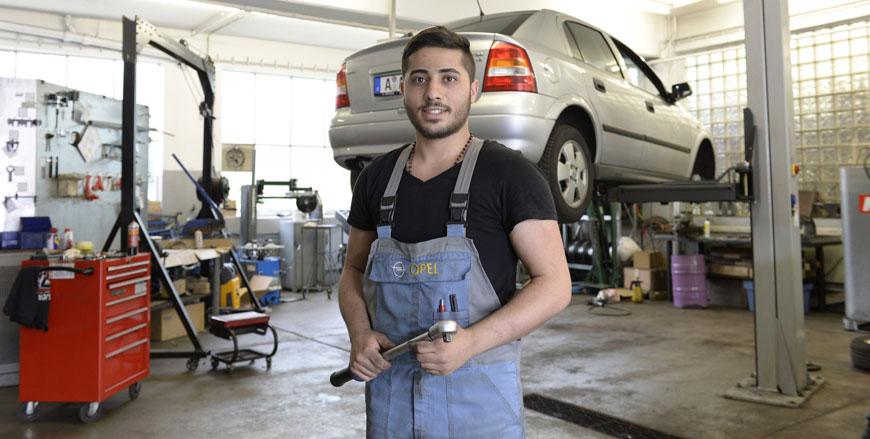You are here
Refugees help fill gaps in German labour market
By AFP - Jul 17,2015 - Last updated at Jul 17,2015

Syrian refugee George Romanos posing at a workshop in Bobingen, southern Germany, on Tuesday (AFP photo)
BOBINGEN, Germany — Like a growing number of German employers, garage-owner Robert Menhofer has decided to give a young refugee a chance and is lavish in his praise for George Romanos, a young trainee from Syria.
“He’s going to be a really good mechanic!” gushes Menhofer, 59. “On the practical side, he’s unbeatable.”
“But not so much on the theoretical side of things ... due to the language,” chimes in, with modesty, his apprentice, dressed in blue overalls and speaking in German, which he has been learning since arriving in Germany.
Romanos, a 21-year-old Christian Syrian, arrived in the southern German state of Bavaria, alone, in the spring of 2013, at the end of a gruelling odyssey that he is reluctant to talk about.
He is one of nearly 86,000 Syrians who have arrived in Germany since the beginning of 2013, fleeing the civil war in their country.
Since the start of the year, the total number of asylum seekers — not just from war-torn Syria, but also from Kosovo, Albania and other countries — taken in by Europe’s top economy is close to 180,000.
The newcomers are not always welcomed with open arms, particularly in eastern Germany, where ugly demonstrations have been staged against asylum homes.
But the refugees are increasingly in demand from companies desperate to find young trainees, particularly in manual jobs and skilled labour in a country with a fast ageing society and a low birthrate.
And there are increasing calls in industry to change legislation to make it easier for them to be integrated into the labour market.
In Augsburg, the biggest town near Bobingen, about 70 kilometres from the Bavarian state capital of Munich, the Chamber of Crafts has campaigned for such changes for years.
Labour shortage
The challenges are twofold, explains Volker Zimmermann, in charge of education at the chamber: to work towards social cohesion in a region where almost every town now has its own home for asylum seekers; but also to combat an ever-increasing shortage of skilled labour.
In and around Augsburg, unemployment stood at 4.2 per cent in June, and 5,000 vacancies remain unfilled. And here, as elsewhere, the shortage of apprenticeships was even more alarming.
The German “dual system” of on-the-job training combined with theoretical learning is no longer attracting sufficient numbers of young people, with as many as 80,000 trainee places left unfilled last year.
“Everyone wants to go to university nowadays,” says Menhofer.
So, when he bumped into Romanos, who was living in a refugee home in Bobingen and who he said is “infatuated with cars”, he jumped at the chance.
They met when Menhofer, as head of the local business association, had asked the home’s residents to help put up the local Christmas market.
Since September 2014, the young Syrian has divided his time between the car workshop and his studies at the local vocational school.
And his boss beams with satisfaction at his apprentice’s progress, describing the young Germans of the same age as “lazy”.
Sait Demir, an intercultural career adviser at the Augsburg Chamber of Crafts, deals with the formalities, which were made more complicated because Romanos’ asylum application had still been pending.
He currently has a temporary two-year permit to stay in Germany.
Things are changing
Romanos’ gross monthly wage is 675 euros ($740) and he has a small flat, the rent for which is paid by the local labour office.
Demir works closely with the labour agency and charities and he has succeeded in placing 19 asylum seekers in apprenticeships since January 1. But he says that it “could be a lot more”.
“Employers are beginning to realise that they can employ motivated, hard-working people who are eager to learn,” says Zimmermann.
But for the time being, “the complicated bureaucracy puts a lot of them off”.
And until their prospective employees’ asylum applications are processed, which can take months, the possibility of them being deported at 24 hours’ notice is like a Damocles sword hanging over both employer and employee.
Nevertheless, in the past two years, “a lot has changed”, Demir said.
Germans have to learn to view the new arrivals as “the workforce which we increasingly need,” two government ministers wrote recently in a newspaper article.
Until now, asylum seekers have not been allowed to work for nine months after they arrive in Germany. But the time limit was shortened to three months last November.
Since January, the federal labour agency has granted permits to more than 6,000 asylum seekers allowing them to work.
Related Articles
AMMAN — Irbid Chamber of Industry and National Alliance Against Hunger and Malnutrition (Najmah) on Monday signed a memorandum of understand
A German government minister said Monday Berlin aimed to set up a trauma centre for victims of a mass rape campaign by the Islamic State (IS) militant group.
ATHENS/BERLIN — More than 240 asylum seekers at a new temporary camp on the Greek island of Lesbos are infected with the novel coronavirus,
















